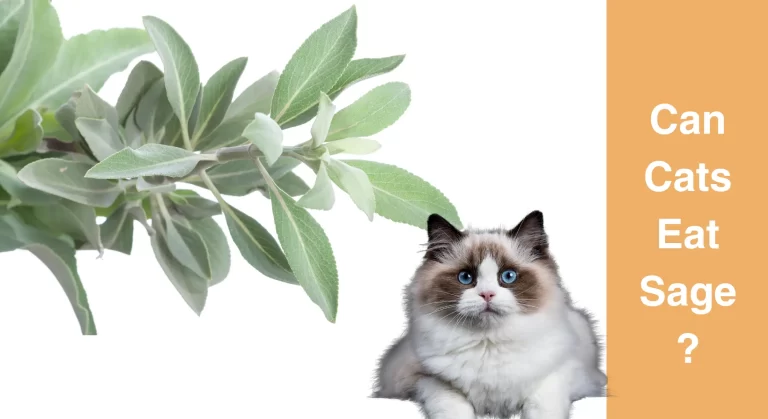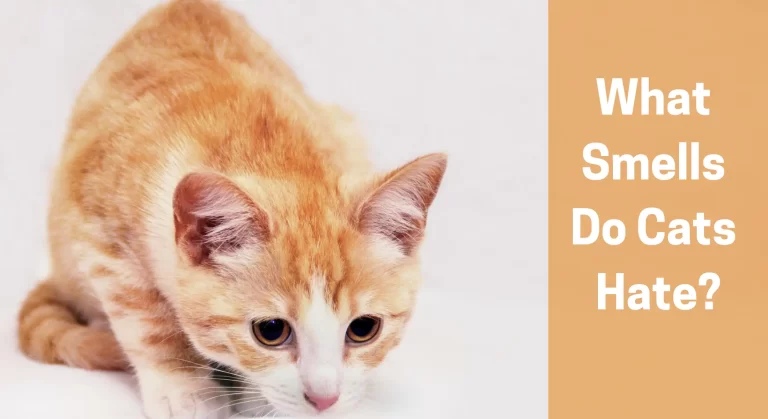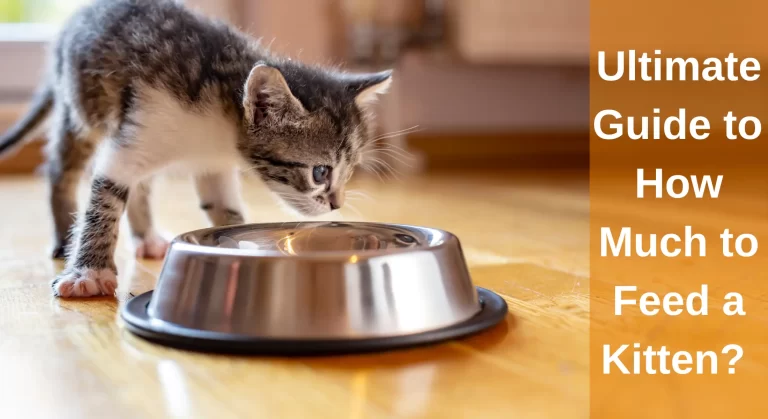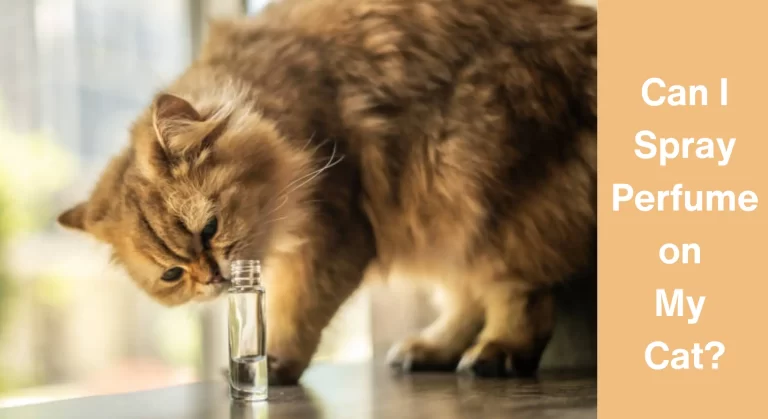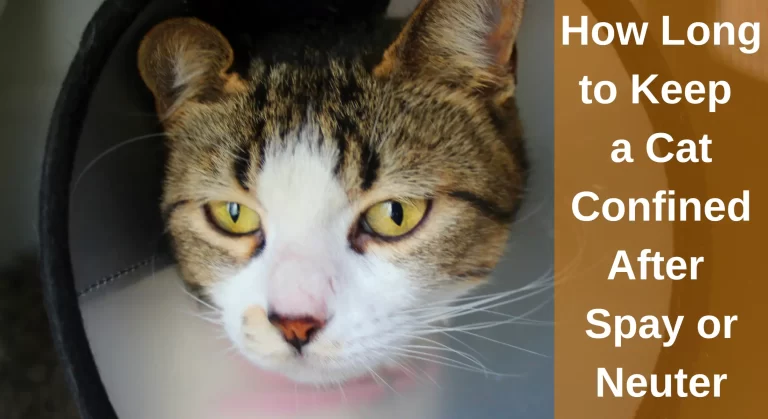Can Cats Eat Bananas? Are Bananas Safe for My Cat?
The banana is packed with healthy carbs, fibre, and nutrients that humans can benefit from. If you have a cat in the house, you might wonder whether bananas are good for them.
Can Cats Eat Bananas? The short answer is yes, While bananas are safe for cats to eat in small quantities, they should not be a staple of their diet. Cats do not require carbohydrates or fruit in their diets, and too much fruit can upset their digestive system.
The article will provide you with a comprehensive summary of cats’ connections with fruits, sweets, and several other dietary preferences in addition to its primary focus on bananas.
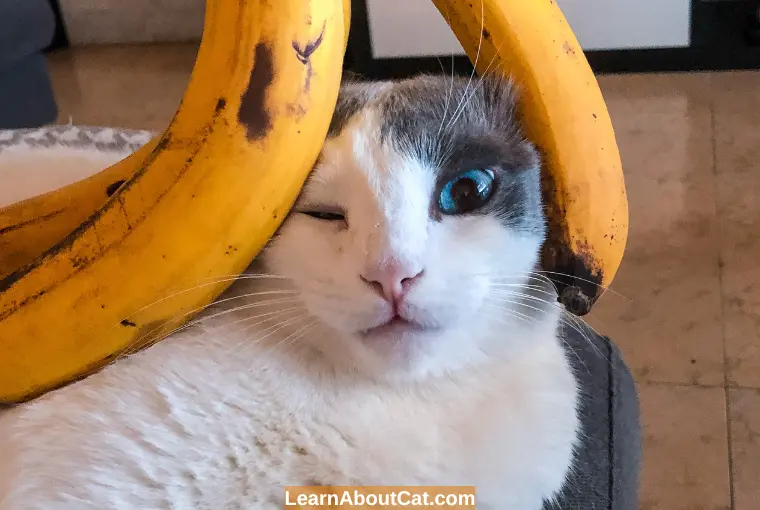
What’s in a Banana? Contents of a Banana
Bananas are a nutritious fruit. It contains large amounts of dietary fibre, copper, manganese, vitamin B6, potassium, and vitamin C. A medium banana has just 105 calories. Also, the glycemic index of bananas is low compared to other fruits.
Its high potassium concentration may provide you with a boost of energy. Potassium can help to prevent muscular cramps. This is the justification for why athletes frequently eat bananas during practices and games.
The Nutritional Value of Bananas
Before we delve into whether or not bananas are safe for cats, let’s take a closer look at the nutritional value of this fruit. A medium-sized banana (118 grams) contains:
- Calories: 105
- Carbohydrates: 27 grams
- Fiber: 3 grams
- Protein: 1 gram
- Fat: 0.4 grams
- Potassium: 422 mg
- Vitamin C: 17% of the daily value
- Vitamin B6: 20% of the daily value
- Magnesium: 8% of the daily value
As you can see, bananas are an excellent source of several essential vitamins and minerals, especially potassium, which are important for maintaining healthy blood pressure and heart function.
Additionally, their low calorie and low fat content makes them a good option for humans as snacks. But, what about cats? Are these nutrients beneficial for them too?
Also Read: Can Cats Eat Lychee?
Can Cats Eat Bananas? Are Bananas Safe for Cats?
Bananas have rapidly established a reputation as a nutrient-dense snack in people’s diets as a result of their amazing nutritional richness. Because it contains fibre, magnesium, potassium, and vitamin C, this fruit is good for us.
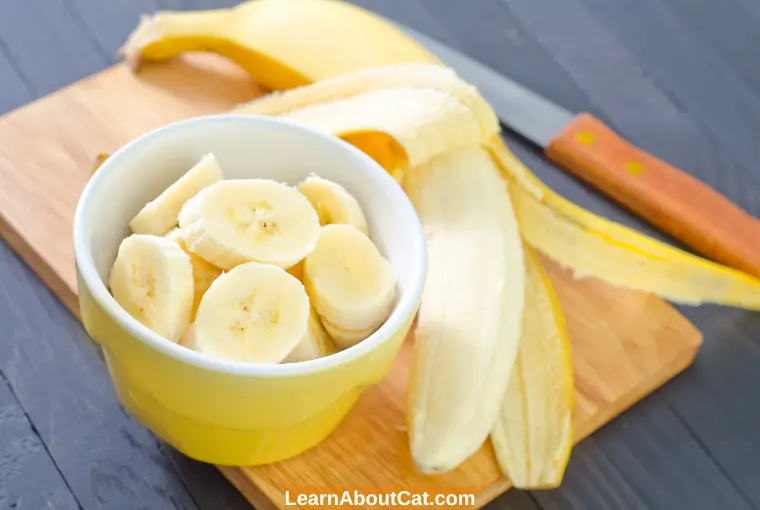
The answer is yes, cats can eat bananas. Bananas are not toxic to cats, and they can consume small amounts of this fruit without any adverse effects. It is however not recommended that your cat consume bananas regularly. Due to their obligate carnivorous nature, cats should eat mostly meat-based proteins in their diet. Cats do not need a diet high in fruits or vegetables.
If a cat eats it in large quantities it is difficult to digest due to its high sugar content. In light of this, continuous exposure to bananas may cause blood sugar levels to rise, which may lead to obesity and diabetes, even though the odd nibble won’t damage your cat.
However, cat food alternatives are more nutrient-dense than the common banana. Since specially-made cat food usually provides all the nutrients, cats need, adding fruits to their diets is normally unnecessary. Furthermore, bananas and other sweet meals are usually ignored by cats.
Check Out: Can Cats Eat Goji Berries? Here’s What You Need to Know
Do Cats Like Bananas?
Cats have a different sense of taste than humans, so some may enjoy the sweetness and texture of bananas while others may not show interest. It’s always a good idea to start with a small amount and observe your cat’s reaction before offering more.
Can Kittens Eat Bananas?
Kittens can eat bananas in moderation once they’ve been weaned and are consuming solid food. However, any new food should be discussed with your veterinarian before being introduced to your kitten
Find Out: Can Cats Eat Honeydew?
Health Benefits of Bananas for Cats
While bananas should not be a significant part of your cat’s diet, there are still some benefits to feeding them small amounts of this fruit.

- Vitamin C has antioxidant properties; this vitamin also increases immunity.
- Vitamin B6 is a crucial coenzyme for the body and brain. It produces proteins, regulates hormones, keeps the body’s neurotransmitters balanced, and keeps a fluid balance.
- Folate encourages the development of robust red blood cells.
- Potassium helps maintain healthy cardiac as well as renal function, promotes bone growth, controls fluid levels, and aids in muscle growth.
- Healthy bones and teeth require calcium to function properly.
- Magnesium promotes healthy bone production and aids in the body’s better use of vitamins and minerals.
- Fibre is abundant in bananas, which is good for the digestive system. By assisting in the movement of food (and hair) through the digestive tract, fibre helps resolve constipation, diarrhoea, and possible obstructions.
These all appear favourable, don’t they? However, bear in mind that cats lack the digestive enzymes necessary for diets high in plants.
Therefore, the only nutrition a banana supplies to your cat is dietary fibre which can aid in digestion and help prevent constipation. They also contain vitamins C and minerals which helps boost the immune system.
If your cat is showing indications of wanting to eat bananas, follow these instructions to appease them and keep them secure.
Risks of Feeding Bananas to Cats
While bananas are not toxic to cats, there are some risks to consider. The first piece of advice is to always speak with your veterinarian before giving your cat any new food/human food. Your veterinarian is aware of the specific benefits and drawbacks of each new diet based on your cat’s health.

Some meals may cause vomiting, diarrhoea, constipation, or other gastrointestinal disturbances in cats that are sensitive to them. After your cat eats any unfamiliar foods, be sure to watch it closely.
Firstly, due to their high sugar content, which can cause a blood sugar spike in cats, bananas should not be given to cats that have medical disorders like diabetes or obesity. It could be fine for a time, but it could result in diabetes or high blood sugar. Symptoms of diabetes are:
- Severe thirst
- Weight loss and increased urination
- Lacking hunger and unable to jump
- Vomiting
Secondly, because they lack the required enzymes to metabolise or digest plant-based foods, your cat may feel uncomfortable consuming them. As a result of digestive issues, cats may have flatulence, nausea, or stomach discomfort. Although they are rare, allergies can happen if a cat eats a banana.
An allergic reaction may result in itchy skin, a rash, or watery eyes. If your cat’s mouth or neck itches, it paws at those areas or rubs against objects.
Lastly, your cat could choke on the banana peel or suffer from an intestinal blockage if it ingests it.
How to Give Bananas to Your Cat?
If you’ve decided to share a banana with your cat, there are some guidelines you should follow to ensure their safety and enjoyment. Here are some tips:
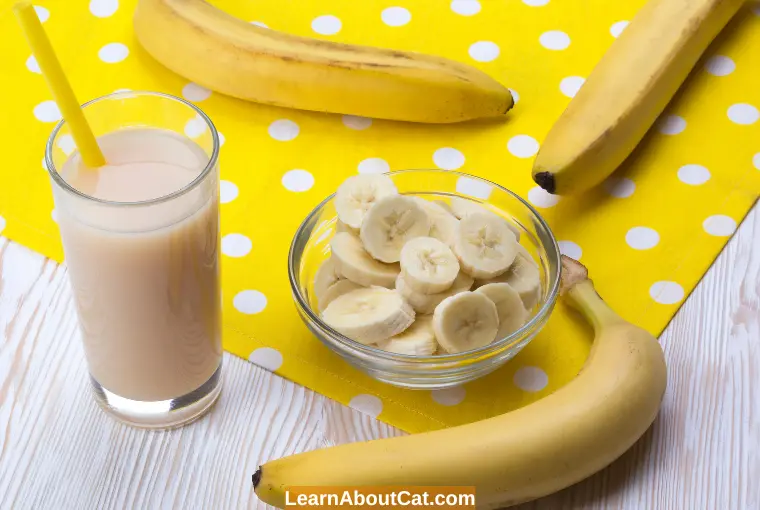
- Feed bananas as an occasional treat, not as a regular part of your cat’s diet.
- Always remove the banana peel, and keep it out of your pet’s line of sight. Cats cannot properly digest banana peels, thus, it is essential to keep them apart from one another.
- Before giving the banana to your cat, cut it into little pieces. Give your pet a small taste, to begin with, and keep an eye on them to see if they respond strangely.
- Analyze your cat’s reaction to a little piece of banana (the size of their kibble or typical rewards).
- Consider mashing the banana and mixing it with your cat’s regular food to make it easier for them to digest. In a bowl without your cat’s normal food, place a tiny slice of banana and mash it until it is mushy.
Cats who are allergic to bananas are extremely unusual, but they do happen. Consult a veterinarian if any allergic symptoms appear.
When are Bananas Harmful to Felines?
Although bananas cannot harm cats, issues might arise if they are overfed. Given that bananas are high in sugar giving them to a youngster might cause digestive issues like vomiting, diarrhoea, stomach pain, and gas.
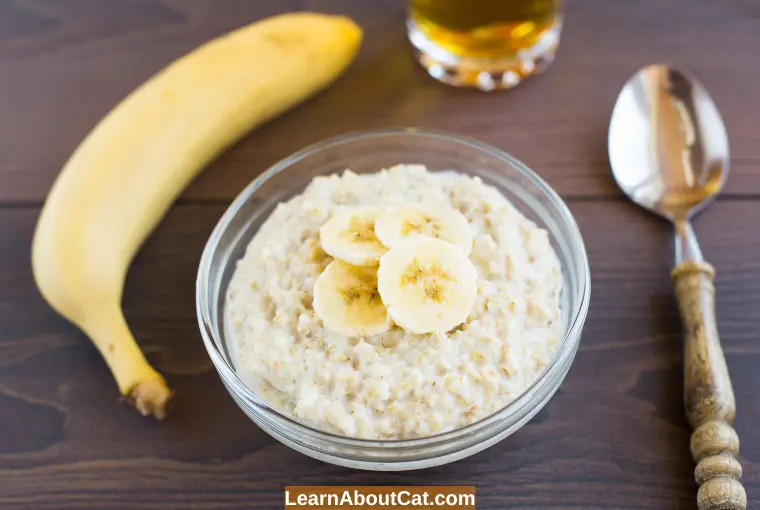
Chances of getting diseases like obesity as well as diabetes increase. Ask your veterinarian if there are any medical conditions before trying to give a banana to your cat.
Similar to humans, cats can also develop allergies to bananas, albeit this is less common.
Get your cat to the vet right away if they exhibit any symptoms of an allergic response, such as a skin rash, discharge from the eyes or nose, scratching or rubbing of the face, facial swelling, or trouble breathing.
Make sure your cat is never around banana peels. They include ethyl acetate, which cats find repulsive and cannot be digested. Choking might also result from peels.
Other Fruits and Vegetables That Are Safe for Cats
While bananas can provide some health benefits to cats, they’re not the only human food that’s safe for feline consumption. Here are some other fruits and vegetables that are safe for cats to eat in moderation:
- Apples (without the seeds)
- Blueberries
- Strawberries
- Cantaloupe
- Watermelon
- Carrots
- Green beans
- Peas
- Spinach
Again, it’s essential to introduce new foods to your cat’s diet slowly and in small amounts to avoid digestive upset.
Frequently Asked Questions
Can cats be allergic to bananas?
Yes, cats can be allergic to bananas or other fruits. Symptoms of an allergic reaction can include itching, swelling, and difficulty breathing. If your cat has a history of allergic reactions or if you notice any of these symptoms after feeding them bananas, discontinue the fruit immediately and contact your veterinarian.
Can cats eat banana chips or dried bananas?
It is not recommended for cats to consume banana chips or dried bananas, since they contain sugar and preservatives, which can cause adverse effects on their health.
Can cats eat banana bread or other baked goods with bananas?
Most baked goods that contain bananas are not suitable for cats, as they’re often high in sugar and other ingredients that can be harmful to their health. Stick to feeding your cat fresh, ripe bananas in moderation.
Can cats benefit from a vegetarian or vegan diet?
No, feeding cats vegetables and fruits should not replace their regular diet. Due to their obligate carnivorous nature, cats should primarily consume meat-based protein. Nutritional deficiencies and health problems can result from too much fruit or vegetable consumption.
Conclusion
The most important lesson is that cats can eat bananas without getting sick. Because bananas don’t provide much nourishment for your cat, it’s better to give it vitamins and minerals instead of treats. A balanced diet created by a Certified Feline Nutritionist is the greatest option for your cat’s nutritional needs.
When feeding your cat treats, keep in mind the daily calorie intake recommendation of 90/10. Your cat should get 90% of the daily calories she needs from her usual cat food, and the other 10% should come from healthy treats. If you continue to feed your cat snacks, you run the risk of him gaining weight or developing diabetes.
Who is Isabella?
My name is Isabella, and I am a dedicated and knowledgeable cat enthusiast. With years of experience caring for cats and a deep love for felines, I made a mission to help other cat lovers navigate the challenges of cat ownership.

